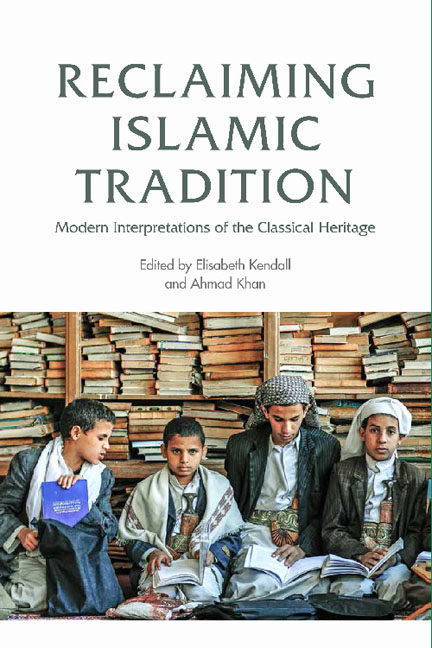Book contents
- Frontmatter
- Contents
- Acknowledgements
- About the Contributors
- Introduction
- 1 Modern Shiʿite Legal Theory and the Classical Tradition
- 2 Muḥammad Nāṣīr al-Dīn al-Albānī and Traditional Hadith Criticism
- 3 Islamic Tradition in an Age of Print: Editing, Printing and Publishing the Classical Heritage
- 4 Reaching into the Obscure Past: The Islamic Legal Heritage and Reform in the Modern Period
- 5 Reading Sūrat al-Anʿām with Muḥammad Rashīd Riḍā and Sayyid Quṣb
- 6 Contemporary Iranian Interpretations of the Qurʾan and Tradition on Women’s Testimony
- 7 Ibn Taymiyya Between Moderation and Radicalism
- 8 The Impact of a Sixteenth-Century Jihad Treatise on Colonial and Modern India
- 9 Jihadist Propaganda and its Exploitation of the Arab Poetic Tradition
- 10 Contemporary Salafi Literature on Paradise and Hell: The Case of ʿUmar Sulaymān al-Ashqar
- Index
3 - Islamic Tradition in an Age of Print: Editing, Printing and Publishing the Classical Heritage
Published online by Cambridge University Press: 11 November 2020
- Frontmatter
- Contents
- Acknowledgements
- About the Contributors
- Introduction
- 1 Modern Shiʿite Legal Theory and the Classical Tradition
- 2 Muḥammad Nāṣīr al-Dīn al-Albānī and Traditional Hadith Criticism
- 3 Islamic Tradition in an Age of Print: Editing, Printing and Publishing the Classical Heritage
- 4 Reaching into the Obscure Past: The Islamic Legal Heritage and Reform in the Modern Period
- 5 Reading Sūrat al-Anʿām with Muḥammad Rashīd Riḍā and Sayyid Quṣb
- 6 Contemporary Iranian Interpretations of the Qurʾan and Tradition on Women’s Testimony
- 7 Ibn Taymiyya Between Moderation and Radicalism
- 8 The Impact of a Sixteenth-Century Jihad Treatise on Colonial and Modern India
- 9 Jihadist Propaganda and its Exploitation of the Arab Poetic Tradition
- 10 Contemporary Salafi Literature on Paradise and Hell: The Case of ʿUmar Sulaymān al-Ashqar
- Index
Summary
For many historians of medieval Islamic history, Marshall G. S. Hodgson's magisterial synthesis of Islamicate societies provides an initiation into the complex and diverse contours of a sprawling medieval civilisation. His sensitivities to intellectual, social, political and military history in The Venture of Islam are precisely what allow for such a wide-ranging engagement with his work. This wide sense of historical ambition helps to explain the work's unparalleled durability. It is also the work's historical ingenuity that makes Hodgson's account of Islamicate societies so difficult to replicate. Hodgson's panoptic approach enables him to move beyond conventional parameters of analysis in which politics and religion feature as the only driving historical forces, to consider the historical peculiarities of an arid-zone cultural civilisation and what that means for trade, economic productivity, labour and social relations. At the same time, Hodgson was able to adumbrate carefully the many features of ‘the great western transformation’, which with some intent he renamed ‘the great western transmutation’, a phenomenon recently popularised by global historians such as Kenneth Pomeranz and Christopher Bayly. Hodgson's own venture into the impact that the great western transmutation had on the Islamic world has been one of the underappreciated aspects of his scholarship. Scholars also seem to have glossed over the fact that many of Hodgson's posthumously published essays explicitly address the role of tradition in the modern Islamic world.
The notion of tradition in Islamic Studies has become synonymous with Talal Asad's insightful 1986 essay, The Idea of an Anthropology of Islam. Tradition is not the focus of Asad's otherwise brilliant extended essay, and his disquisition on the Islamic tradition as a discursive tradition occupies no more than a few pages. Still, Asad's brief remarks have been transformed into a theory of Islamic tradition. Meanwhile, it is often overlooked that Norman Calder, a historian of Islamic law and legal literature, explained the activity of jurists writing within the madhhab tradition as a form of discursive tradition; and, apparently, his formulation of discursive tradition was independent of Asad's published work.
- Type
- Chapter
- Information
- Reclaiming Islamic TraditionModern Interpretations of the Classical Heritage, pp. 52 - 99Publisher: Edinburgh University PressPrint publication year: 2018



